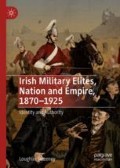Abstract
A number of surprising conclusions are offered, which provide greater nuance to the history of Irish military elites. The diversity of backgrounds to be found in the officer corps reflects the central importance of the British Army to Irish society in the late nineteenth century, while the mechanisms of socialisation which governed access are also reflective of broader middle-class trends towards professionalisation and the accumulation of social capital, and the decline of the aristocracy. The British Army as a node of interaction between Irish society and the overseas empire is discussed. The Home Rule question is assessed as the precipitating factor in the systemic crisis faced by the officer corps in Ireland, culminating in the 1914 Curragh mutiny. Irish officers’ increasingly uncomfortable social identity and their incompatibility with the strain of Irish national identity which emerged immediately before the First World War are explored and weighed against the Great War itself as the force which finally, in the words of one Irish officer, ‘killed society’. Through all of these events, the most surprising realisation may be that the demographic make-up of the officer corps—and the proportion of Irishmen taking the oath and embarking for the empire—hardly changed between the 1870s and 1920s. These myriad factors are drawn together in a discussion of the sustained and continuing presence of Irish officers in the British Army to this day.
Perhaps more than any other citizens of the Empire, Irishmen are able to adapt themselves to altered circumstances. The problems of the new India … although different, may prove to be not less fruitful than those of the India where so many of their fathers won fame and fortune.
—Lord Meston addressing students of Trinity College Dublin. Irish Times, 28 February 1925
Allegations having been made that ex-Service men had been victimised by the Irish Free State Government, a meeting, presided over by General Sir Bryan Mahon, was held … He understood that a number of ex-Service men who were in His Majesty’s Forces have lost their jobs … General W.B. Hickie said that he was rather doubtful about the allegations … He believed that the Committee now about to be formed would help to allay a great deal of dissatisfaction
—Irish Times, 28 March 1925
Access this chapter
Tax calculation will be finalised at checkout
Purchases are for personal use only
Notes
- 1.
Hew Strachan, The Politics of the British Army (Oxford, 1997), p. 15.
- 2.
Peter Haslinger, ‘Austria-Hungary’ in Gerwarth, Robert, and Erez Manela, eds., Empires at War 1911–1923 (Oxford, 2014), p. 87.
- 3.
Joshua Sanborn, ‘The Russian Empire’, in Ibid. pp. 104–105; Jane McGaughey, Ulster’s Men: Protestant Unionist Masculinities and Militarization in the North of Ireland, 1912–1923 (Montreal, 2012), p. 176.
- 4.
Heather Jones, ‘The German Empire’, in Ibid. p. 71; Tim Wilson, ‘Ghost Provinces, Mislaid Minorities: The Experience of Southern Ireland and Prussian Poland Compares, 1918–23’, Irish Studies in International Affairs 13 (2002), passim.
- 5.
Biagini and Mulhall, eds., preface to The Shaping of Modern Ireland: A Centenary Assessment (Sallins, 2016), pp. v–vi.
- 6.
Belfast News-Letter, 6 June 1888; Kerry Sentinel, 21 August 1915; Irish Examiner, 18 August 1915.
- 7.
Michael Silvestri, Ireland and India: Nationalism, Empire and Memory (Cambridge, 2006), pp. 125–126.
- 8.
Frederick Cooper and Ann Laura Stoler, Tensions of Empire: Colonial Cultures in a Bourgeois World (Berkeley, 1997); Susan Meyer, Imperialism at Home: Race and Victorian Women’s Fiction (London, 1996); Anne McClintock, Imperial Leather: Race, Gender, and Sexuality in the Colonial Context (New York, 1995).
- 9.
F. P. Crozier, Five Years Hard (London, 1932), p. 217; Chaplain McRory, diary of 1917, PRONI.
- 10.
Edward Spiers, The Army and Society 1815–1914 (London, 1980), p. 8.
- 11.
Freeman’s Journal, 11 March 1919.
- 12.
Dan Finlay, ‘Outflanked by Easter Week: Death in the Flemish Mud’, Books Ireland 226 (1999), p. 311.
- 13.
Silvestri, Ireland and India, p. 158; Thomas Bartlett, ‘The Connaught Rangers Mutiny in India, 1920’, History Ireland 6:1 (1998), pp. 6–7.
- 14.
Gwynn, quoted in Christopher Fauske, ‘A Life Merely Glimpsed: Louis MacNeice at the End of the Anglo-Irish Tradition’, Canadian Journal of Irish Studies 20 (1994), p. 19.
- 15.
J. G. Darwin, ‘Fear of Falling: British Politics and Imperial Decline since 1900’, Transactions of the Royal Historical Society 36 (1986), pp. 27–43.
- 16.
Hubert Gough, Soldiering On (London, 1954); F. P. Crozier, Ireland For Ever (London, 1930). Dunraven, writing in Past Times, encapsulates the early remembrances of the independence period succinctly, calling 1921 a ‘year of disgrace’.
- 17.
Jane Leonard, ‘Survivors’, in Horne, John, ed., Our War: Ireland and the Great War (Dublin, 2008), p. 219.
Author information
Authors and Affiliations
Corresponding author
Rights and permissions
Copyright information
© 2019 The Author(s)
About this chapter
Cite this chapter
Sweeney, L. (2019). Conclusion. In: Irish Military Elites, Nation and Empire, 1870–1925. Palgrave Macmillan, Cham. https://doi.org/10.1007/978-3-030-19307-2_10
Download citation
DOI: https://doi.org/10.1007/978-3-030-19307-2_10
Published:
Publisher Name: Palgrave Macmillan, Cham
Print ISBN: 978-3-030-19306-5
Online ISBN: 978-3-030-19307-2
eBook Packages: HistoryHistory (R0)

